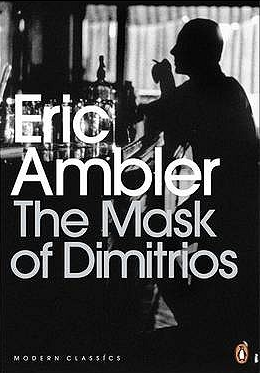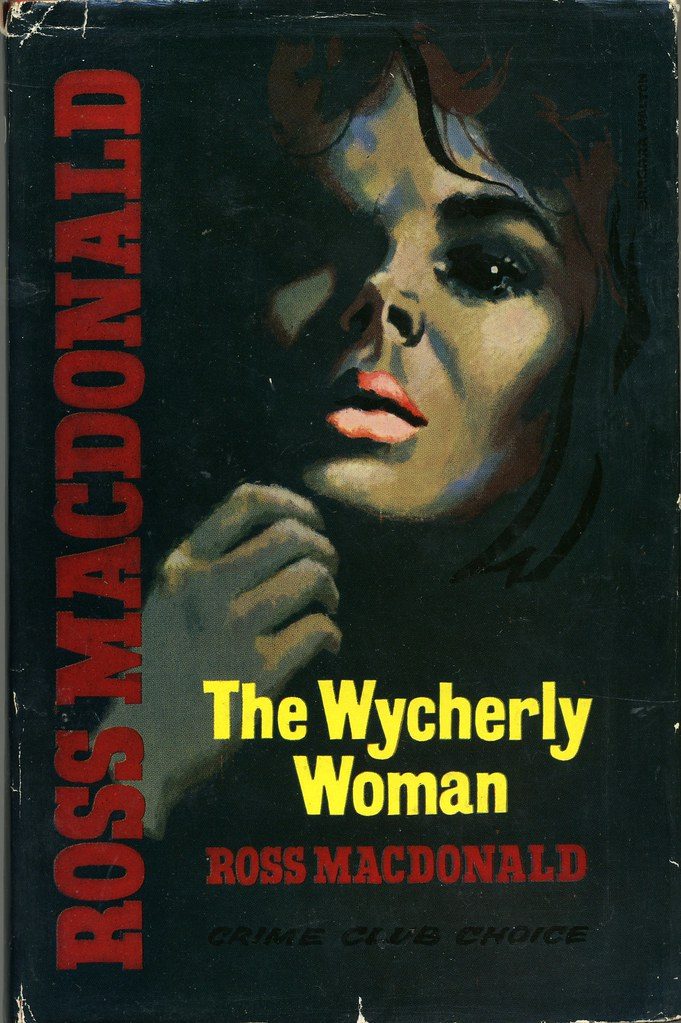Because I also like books without pictures, this week let’s switch gears for a bit and look at a couple of very cool non-comics detective novels:
THE MASK OF DIMITRIOS
(Eric Ambler, 1939)
“A Frenchman named Chamfort, who should have known better, once said that chance was a nickname for Providence.
It is one of those convenient, question-begging aphorisms coined to discredit the unpleasant truth that chance plays an important, if not predominant, part in human affairs. Yet it was not entirely inexcusable. Inevitably, chance does occasionally operate with a sort of fumbling coherence readily mistakable for the workings of a self-conscious Providence.
The story of Dimitrios Makropoulos is an example of this.”
In The Mask of Dimitrios (published in the United States as A Coffin for Dimtrios), we follow the saga of Charles Latimer, a British lecturer in political economy and writer of detective stories who becomes obsessed with tracing the past of the recently deceased master criminal Dimitrios Makropoulos, chasing leads across Europe on the eve of World War II. The result is, at first sight, a tale about detection, with Latimer belonging to the tradition of amateur sleuths who bite off more than they can chew… Yes, it’s the classic motif of the genre author who faces the fact that things are much murkier than what he writes about (combined with the trope of the innocent abroad). Before the end of the book, Latimer has lost his naiveté and gained closer knowledge of heists, conspiracy, assassination, prostitution rings, drug dealers, conning, and blackmail – not to mention international finance!
This is a proper crime novel (with a bit of globetrotting adventure and espionage thrown in), typically fascinated with shady nightclubs and the overall seediness of the underworld, whose workings are often explained in great detail. The 1944 Hollywood adaptation lost much of the edge (because of the film industry’s censorship), but the fact that it had Jean Negulesco as director, Arthur Edeson as cinematographer, and the Peter Lorre-Sydney Greenstreet duo in the cast meant that at least they got the noirish atmosphere just right (this team went on to collaborate on The Conspirators and Three Strangers).
That said, The Mask of Dimitrios is not a hardboiled read – instead, a lot of it involves cultured men having lengthy, sophisticated conversations; and the violence doesn’t usually merit close descriptions (except for the grisly climax), leaving us to fill in the blanks. Eric Ambler’s prose has a light touch, being prone to wit and the occasional lyrical bursts. It’s more intellectual than visceral, even if there are plenty of gripping passages. This is how the narration conveys Latimer’s thoughts early on, when the Turkish Colonel Haki shows him Dimitrios’ corpse:
“So many years. Europe in labor had through its pain seen for an instant a new glory, and then had collapsed to welter again in the agonies of war and fear. Governments had risen and fallen; men and women had worked, had starved, had made speeches, had fought, had been tortured, had died. Hope had come and gone, a fugitive in the scented bosom of illusion. Men had learned to sniff the heady dreamstuff of the soul and wait impassively while the lathes turned the guns for their destruction. And through those years, Dimitrios had lived and breathed and come to terms with his strange gods. He had been a dangerous man. Now, in the loneliness of death, beside the squalid pile of clothes that was his estate, he was pitiable.”
This balancing act between the mundane and the grand scale of things is Ambler’s trademark. It’s also present in the way the story unfolds, with Charles Latimer (and us) only achieving disjointed glimpses of a wider network of strings being pulled off-page, reflecting how petty our perceptions can be when framed against the insurmountable scale and impenetrability of global affairs. (Moreover, like John le Carré after him, Ambler conveyed reality’s complex interconnectedness by building an intricate fictional world across his spy novels, suggesting that there is always a bigger picture… so Latimer shows up as a key supporting player in The Intercom Conspiracy, just as Colonel Haki reappears in Journey into Fear and is mentioned in The Light of Day.)
One of the best analysis of Ambler’s work, Michael Denning’s Cover Stories: Narrative and Ideology in the British Spy Thriller, describes his authorial voice in the book: ‘This cynical, detached narrator with his sometimes labored ironies and occasionally pretentious historical meditations is a mark of the Ambler metaphysic, the meshing of the formal and the ideological point of view. This historian sets the tale of Dimitrios against a matter-of-fact narrative of European history since the Great War; but he also delights in the role of chance and contingency, and in the grotesque, indeed melodramatic, confusion of levels it causes.’
As you can see, The Mask of Dimitrios is a richly multilayered tapestry. It explores classic dichotomies such as chaos vs divine order, conventional values vs moral relativism, and reality vs fiction (or, as one character puts it, ‘the difference between the stupid vulgarities of the real life and the ideal existence of the imagination’). And yet, at the same time, the book is deeply rooted in its historical context: it’s ultimately a treatment on the interwar period, the life of crime of this one individual placed in relation to the larger processes taking place in geopolitics and economics. This point is nailed through an amazing moment in the novel’s final stretch, when Latimer tries to come to grips with everything he has learned about Dimitrios along the way:
“But it was useless to try to explain him in terms of Good and Evil. They were no more than baroque abstractions. Good Business and Bad Business were the elements of the new theology. Dimitrios was not evil. He was logical and consistent; as logical and consistent in the European jungle as the poison gas called Lewisite and the shattered bodies of children killed in the bombardment of an open town. The logic of Michaelangelo’s David, Beethoven’s quartets and Einstein’s physics had been replaced by that of the Stock Exchange Year Book and Hitler’s Mein Kampf.”
THE WYCHERLY WOMAN
(Ross MacDonald, 1961)
“Coming over the pass you can see the whole valley spread out below. On a clear morning, when it lies broad and colored under a white sky, with the mountains standing far back on either side, you can imagine it’s the promised land.
Maybe it is for a few. But for every air-conditioned ranchhouse with its swimming pool and private landing strip, there are dozens of tin-sided shacks and broken-down trailers where the lost tribes of the migrant workers live. And when you leave the irrigated areas you find yourself in gray desert where nobody lives at all. Only the oil derricks grow there, an abstract forest casting no shade. The steady pumps at their bases nod their heads like clockwork animals.”
A millionaire hires private investigator Lew Archer to find his missing daughter. Along the way, Archer finds blackmail, murder, and lurid family drama (we know from early on that we’re bound to get a Greek tragedy flavor because Archer’s client is called Homer). With their sardonic PI narrator, vivid descriptions of southern California, labyrinthine plots, and crackling dialogue, it’s tempting to label Ross MacDonald’s novels as Chandler-esque – not in the sense of a pale imitation or pastiche of Raymond Chandler’s writing, but as a proper successor, perfectly emulating the style of the Philip Marlowe series.
That said, while Ross MacDonald may not get too many points for originality, I think it’s a disservice to reduce his Lew Archer books to mere derivative fanfic. Not only did MacDonald master the art of the pithy internal monologue and the insightful turn of phrase (‘The night clerk looked at me the way night clerks were always looking at me, with dubiety tinged by the suspicion that the costumer might be right and I might be a costumer.’), he elevated it, refining the kind of believable characterization that suggests psychological depth and social awareness. Moreover, he was a chronicler of his own time, which means we get to see that type of gaze fall over an evolving American landscape…
“Boulder Beach College stood on the edge of the resort town that gave it its name, in a green belt between some housing tracts and the intractable sea. It was one of those sudden institutions of learning that had been springing up all over California to handle the products of the wartime population explosion. Its buildings were stone and glass, so geometric and so spanking new that they hadn’t begun to merge with the landscape. The palms and other plantings around them appeared artificial; they fluttered like ladies’ fans in the fresh breeze from the sea.
Even the young people sitting around on the grass or sauntering with their books from building to building, didn’t look indigenous to me. They looked like extras assembled on a set for a college musical with a peasant subplot.”
I admit this is comfort food for me. Overall, The Wycherly Woman doesn’t provide anything I can’t find elsewhere – the plot twists, the dodgy witnesses, the seedy joints, the rich men, the sad women, the broken dreams, the mistaken identities, the unexpected dead body halfway through, the shady secrets underneath the upper-class veneer, and that moment when the detective gets knocked out and the narration fades to black. There are plenty of surprises within the story, but the story itself is not surprising, staying comfortably within the bounds of the genre. Unlike what I told you about The Mask of Dimitrios, don’t expect any larger statement about metaphysics or geopolitics here, just a solid mystery yarn.
Yet this is my platonic ideal of that formula. The intrigue is tortuous, but the storytelling is crystal clear, even as it keeps throwing new lively characters and revelations at the reader, one after the other. And on top of the fun of putting the various puzzle pieces together in your head while trying to keep up with Lew Archer’s investigation, the world-weary prose is pure delight (‘I watched her the way you watch an old late movie that you’ve seen before.’). In particular, although some of the cast can be quite melancholic and things get pretty dark at times, the dialogue is constantly snappy, oozing with wit and subtext.
Seriously, I just can’t get enough of conversations like this one:
““I’m Miss Smith.”
“Not married?”
“No. Are you?”
“I was at one time. It didn’t take.”
“I know the problem,” she said. “I’ve lived with it. Call it living. What do you do for a living?”
“I sort of live off the country.”
”I don’t get it. What do you really do? No, wait, let me guess. I’m good at guessing people’s occupations.” She sounded like a bored child looking for a game to play.
“Go ahead and guess.”
Her gaze slipped down from my face to my shoulders, as if she was looking for a place to cry on. Tentatively, her hand came out and palped my left bicep. She had pretty hands, except for the tips of her fingers, which had been bitten.
“Are you a professional athlete? You seem to be in very good trim, for a middle-aged man.”
It was a mixed compliment.
“Wrong. I’ll give you two more guesses.”
“What do I win if I guess right?”
“I’ll carve you a plaque.”
“Oh, fine. I need one for my grave.””



We have just lost Denny O’Neil, one of comics’ greats.